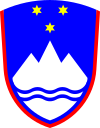Janša II cabinet | |
|---|---|
10th Cabinet of Slovenia | |
 | |
| Date formed | 10 February 2012 |
| Date dissolved | 20 March 2013 |
| People and organisations | |
| Head of state | Danilo Türk Borut Pahor |
| Head of government | Janez Janša |
| Member party |
|
| Status in legislature |
|
| Opposition party |
|
| Opposition leader | |
| History | |
| Election | 2011 Slovenian parliamentary election |
| Predecessor | Pahor cabinet |
| Successor | Bratušek Cabinet |
 |
|---|
|
UN Member State |
The 10th Government of Slovenia and the second one of Janez Janša was announced on 10 February 2012. It was formed after the 2011 Slovenian parliamentary election. It was the second government of Janez Janša, and so he became the second premier to return to the position, after Janez Drnovšek, who was prime minister four times.
On 5 January 2012, President Danilo Türk proposed Zoran Janković as the candidate to form a government to the National Assembly. Two days before the scheduled voting, the Slovenian Association of Journalists and Commentators, the second largest journalists' association in the country, issued a statement raising the concern that Janković might abuse his power as prime minister by curtailing the freedom of media through intimidation.[1] A coalition agreement between PS, SD, DL and DeSUS was initialled on 7 January.[2] However, in the evening of 9 January, DL announced it would not support Janković as the new prime minister and also not join his coalition, due to large differences in the programs of the parties.[3] On 11 January, Janković was not elected as the new prime minister by the National Assembly. In a secret ballot, his candidacy only gained the support of 42 deputies, two less than expected prior to the voting, and four short of the absolute majority needed for his election. Following the election of Janez Janša as the Prime Minister in the second round of the voting, Positive Slovenia became an opposition party.[4]
Janša's second government did not finish its mandate. The trouble began when Commission for the Prevention of Corruption of the Republic of Slovenia (KPK) published a report of control of the assets of each president of Slovenian parliamentary parties. Janez Janša and Zoran Janković did not know how to explain the source of all of their assets
Cabinet members came from five parties of the new coalition, until SLS, DL and DeSUS left the coalition on 23 January 2013:
- Slovenian Democratic Party (SDS) - 4 Ministers - 6 Ministers at the end of the term
- New Slovenia (NSi) - 1 Minister + 1 Minister without portfolio
- Gregor Virant's Civic List (DL) - 2 Ministers - Left coalition with resignation of both ministers on 23 January 2013
- Democratic Party of Pensioners of Slovenia (DeSUS) - 2 Ministers - Left coalition on 23 January 2013 but both ministers stayed on positions
- SLS - 2 Ministers - Left coalition on 23 January 2013 but both ministers stayed on positions
- ^ "ZNP: Bo Zoran Janković kazensko preganjal novinarje tudi kot premier?". MMC RTV Slovenija. 9 January 2012.
- ^ "Coalition Agreement Initialled, Final Decision Due Next Week". STA - Slovenska tiskovna agencija. 7 January 2012. Archived from the original on 15 January 2015. Retrieved 15 January 2015.
- ^ "Virant List Says No to Janković and His Coalition (flash)". STA - Slovenska tiskovna agencija. 9 January 2012. Archived from the original on 15 January 2015. Retrieved 15 January 2015.
- ^ "Jankoviću ni uspelo". Finance. 11 January 2012.